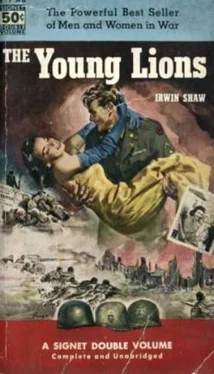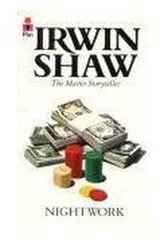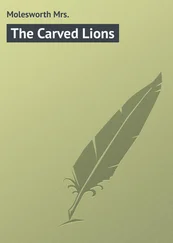Irwin Shaw - The Young Lions
Здесь есть возможность читать онлайн «Irwin Shaw - The Young Lions» весь текст электронной книги совершенно бесплатно (целиком полную версию без сокращений). В некоторых случаях можно слушать аудио, скачать через торрент в формате fb2 и присутствует краткое содержание. Жанр: Классическая проза, на английском языке. Описание произведения, (предисловие) а так же отзывы посетителей доступны на портале библиотеки ЛибКат.
- Название:The Young Lions
- Автор:
- Жанр:
- Год:неизвестен
- ISBN:нет данных
- Рейтинг книги:4 / 5. Голосов: 1
-
Избранное:Добавить в избранное
- Отзывы:
-
Ваша оценка:
- 80
- 1
- 2
- 3
- 4
- 5
The Young Lions: краткое содержание, описание и аннотация
Предлагаем к чтению аннотацию, описание, краткое содержание или предисловие (зависит от того, что написал сам автор книги «The Young Lions»). Если вы не нашли необходимую информацию о книге — напишите в комментариях, мы постараемся отыскать её.
The Young Lions — читать онлайн бесплатно полную книгу (весь текст) целиком
Ниже представлен текст книги, разбитый по страницам. Система сохранения места последней прочитанной страницы, позволяет с удобством читать онлайн бесплатно книгу «The Young Lions», без необходимости каждый раз заново искать на чём Вы остановились. Поставьте закладку, и сможете в любой момент перейти на страницу, на которой закончили чтение.
Интервал:
Закладка:
"No," she said. "I'm not anybody's girl."
He laughed, an insane, creaking laugh.
"My aunt," she warned.
"Well," he whispered, "the trolley to Eastern Parkway. Good night. Thank you. Good night."
But he didn't move. They stared at each other in the shadowy, watery light from the lamp-post.
"Oh, Lord," he said softly, full of anguish, "you don't know, you just don't know."
He heard the lock of the gate opening, and then the gate was open and he had taken the one step in. They kissed, but it wasn't like the first kiss. Somewhere within him something was thundering, but he couldn't help feeling that perhaps, in the middle of it, she would step back and hit him again.
She moved slowly away from him, looking at him with a dark smile. "Don't get lost," she said, "on the way home."
"The trolley," he whispered, "the trolley to Eastern Parkway and then… I love you," he said. "I love you."
"Good night," she said. "Thanks for taking me home."
He stepped back and the gate closed between them. She turned and padded gently through the door in her stockinged feet. Then the door was shut and the street was empty. He started towards the trolley car. It didn't occur to him until he was at the door of his own room nearly two hours later that he had never before in all his twenty-one years said "I love you" to anyone.
In the next two months Noah and Hope wrote each other forty-two letters. They worked near each other and met every day for lunch and almost every night for dinner, and they slipped away from their jobs on sunny afternoons to walk along the docks and watch the ships passing in and out of the harbour. Noah made the long, shuttling trip back and forth to Brooklyn thirty-seven times in the two months, but their real life was carried through the United States mails.
Sitting next to her, in no matter how dark and private a place, he could only manage to say "You're so pretty," or "I love the way you smile," or "Will you go to the movies with me on Sunday night?" But with the heady freedom of blank paper, and through the impersonal agency of the letter-carrier, he could write, "Your beauty is with me day and night. When I look out in the morning at the sky, it is clearer because I know it is covering you, too; when I look up the river at the bridge, I believe it is a stronger bridge because you have once walked across it with me; when I look at my own face in the mirror, it seems to me it is a better face, because you have kissed it the night before."
And Hope, who had a dry, New England severity in her makeup that prevented her from offering any but the most guarded and reticent expressions of love in person, would write…
"You have just left the house and I think of you walking down the empty street and waiting in the spring darkness for the trolley car, and riding in the train to your home. I will stay up with you tonight while you make your journey through the city. Darling, as you travel, I sit here in the sleeping house, with one lamp on, and think of all the things I believe about you. I believe that you are good and strong and just, and I believe that I love you. I believe that your eyes are beautiful and your mouth sad and your hands supple and lovely…"
And then, when they would meet, they would stare at each other, the glory of the written word trembling between them, and say "I got two tickets for a show. If you're not doing anything tonight, want to go?"
Then, late at night, light-headed with the dazzle of the theatre, and love for each other, and lack of sleep, standing embraced in the cold vestibule of Hope's house, not being able to go in, because her uncle had a dreadful habit of sitting up in the living-room till all hours of the morning reading the Bible, they would hold each other desperately, kissing until their lips were numb, the life of their letters and their real life together fusing for the moment in a sorrowing burst of passion.
They did not go to bed with each other. First of all, there seemed to be no place in the whole brawling city, with all its ten million rooms, that they could call their own and go to in dignity and honour. Then, Hope had a stubborn religious streak, and every time they veered dangerously close to consummation, she pulled back, alarmed. "Some time, some time," she would whisper. "Not now…"
"You will just explode," Roger told him, grinning, "and blow away. It's unnatural. What's the matter with the girl? Doesn't she know she's the post-war generation?"
"Cut it out, Roger," Noah said sheepishly. He was sitting at the desk in their room, writing Hope a letter, and Roger was lying flat on his back on the floor, because the spring of the sofa had been broken five months ago and the sofa was very uncomfortable for a tall man.
"If you're not careful," Roger said, "you're going to find yourself a married man."
Noah stopped typing. He had bought a typewriter on time payments when he found himself writing so many letters.
"No danger," he said. "I'm not going to get married." But the truth was he had thought about it again and again, and had even, in his letters, written tentatively about it to Hope.
"Maybe it wouldn't be so bad at that," Roger said. "She's a fine girl and it'd keep you out of the draft."
They had avoided thinking about the draft. Luckily, Noah's number was among the highest. The Army hung somewhere in the future, like a dark, distant cloud in the sky.
"No," said Roger, judiciously, from the floor, "I have only two things against the girl. One, she keeps you from getting any sleep. Two, you know what. Otherwise, she's done you a world of good."
Noah glanced at his friend gratefully.
"Still," Roger said, "she ought to go to bed with you."
"Shut up."
"Tell you what. I'll go away this week-end and you can have the place." Roger sat up. "Nothing could be fairer than that."
"Thanks," Noah said. "If the occasion arises, I'll take your offer."
"Maybe," Roger said, "I'd better talk to her. In the role of best friend, concerned for his comrade's safety. 'My dear young lady, you may not realize it, but our Noah is on the verge of leaping out of the window.' Give me a dime, I'll call her this minute."
"I'll manage it myself," Noah said, without conviction.
"How about this Sunday?" Roger asked. "Lovely month of June, etc., the full bloom of summer, etc…"
"This Sunday is out," said Noah. "We're going to a wedding."
"Whose?" Roger asked. "Yours?"
Noah laughed falsely. "Some friend of hers in Brooklyn."
"You ought to get a wholesale rate," Roger said, "from the Transit System." He lay back. "I have spoken. I now hold my peace."
The wedding on Sunday was held in a large house in Flatbush, a house with a garden and a small lawn, leading down to a tree-shaded street. The bride was pretty and the minister was quick and there was champagne.
It was warm and sunny and everyone seemed to be smiling with the tender, unashamed sensuality of wedding guests. In corners of the large house, after the ceremony, the younger guests were pairing off in secret conversations. Hope had a new yellow dress. She had been out in the sun during the week and her skin was tanned. Noah kept watching her proudly and a little anxiously as she moved about, her hair dark and tumbled in a new coiffure above the soft golden flash of her dress. Noah stood off to one side, sipping the champagne, a little shy, talking quietly from time to time to the friendly guests, watching Hope, something inside his head saying, her hair, her lips, her legs, in a kind of loving shorthand.
He kissed the bride and there was a jumbled confusion of white satin and lace and lipstick-taste and perfume and orange blossom. He looked past the bright, moist eyes and the parted lips of the bride to Hope, standing watching him across the room, and the shorthand within him noted her throat, her waist. Hope came over and he said, "There's something I've wanted to do," and he put out his hands to her waist, slender in the tight bodice of her new dress. He felt the narrow, girlish flesh and the intricate small motion of the hipbones. Hope seemed to understand. She leaned over gently and kissed him. He didn't mind, although several people were watching, because at a wedding everybody seemed licensed to kiss everyone else. Besides, he had never before drunk champagne on a warm summer's afternoon.
Читать дальшеИнтервал:
Закладка:
Похожие книги на «The Young Lions»
Представляем Вашему вниманию похожие книги на «The Young Lions» списком для выбора. Мы отобрали схожую по названию и смыслу литературу в надежде предоставить читателям больше вариантов отыскать новые, интересные, ещё непрочитанные произведения.
Обсуждение, отзывы о книге «The Young Lions» и просто собственные мнения читателей. Оставьте ваши комментарии, напишите, что Вы думаете о произведении, его смысле или главных героях. Укажите что конкретно понравилось, а что нет, и почему Вы так считаете.











